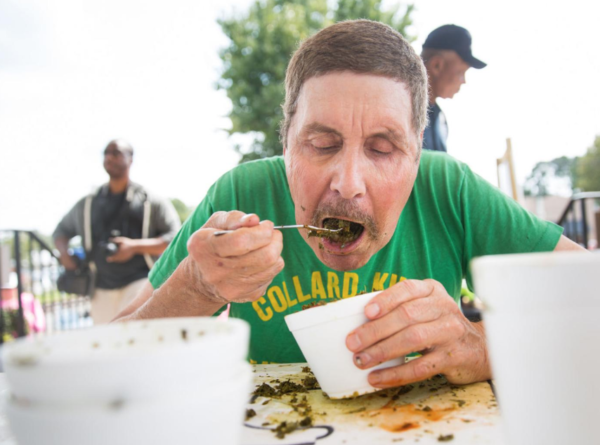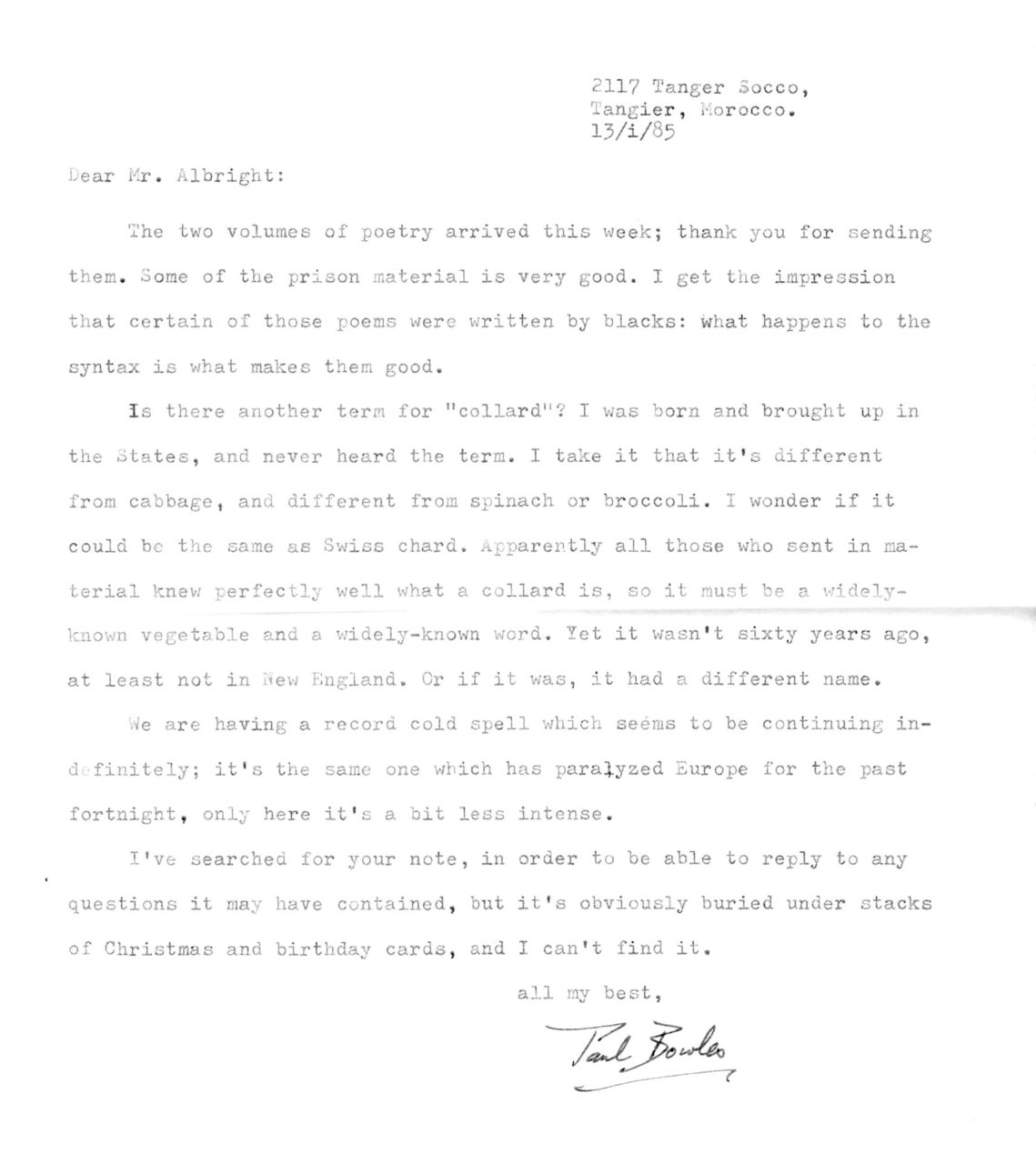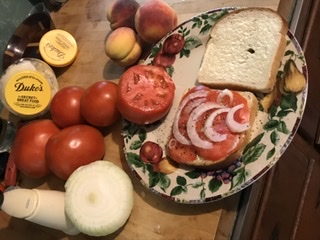Foodways dominate my research and writing interests in Southern culture, which is ongoing. I’ve taken the ‘Cue Pledge, am a certified (by the NC Pork Council) pig pickin’ judge, and if I hadn’t so disliked collards, it’s easy to imagine that I’d never have gotten a tenure track job at ECU: Bill Shepherd first showed me his nitrate copies of “Pitch a Boogie Woogie” because, he said, of how much publicity Leaves of Greens: The Collard Poems, which Luke Whisnant and I co-edited in 1984, had generated, and then Keats Sparrow said that it was how things had gone with restoring and re-premiering “Pitch” that convinced him to ask me to launch and edit the North Carolina Literary Review.
That summer running up to the annual Collard Festival in Ayden, we did lots of interviews with local media as well as Canadian National Radio and NPR, as a kind of good guy/bad guy on collards: Luke loved them, and most of the poets sang their praises. But we got some pretty powerful anti-collards poems, too, and I was their champion. We offered Fred Chappell $10 to write a collard poem for us, and of course he obliged, and then when the Wall Street Journal asked him if he could recite it, he said sure, and made up a new poem on the spot. USA Today and the International Herald Tribune ran stories on our project but both neglected to indicate a $1 entry fee was required, so Luke and I wound up covering for enough poets that we were able to give $100 to the winner, Harvey Estes; $50 to runner-up Rose White; and $25 third-place to Ayden resident Shirley Dennis, who with husband Bum ran the legendary Ayden eatery Bum’s Restaurant that provided all the heirloom collards for the festival vendors and its popular eating competition. In all, we received over 500 entries, from most of the United States and several European countries. A couple of school classes took to the task, and the summer of 1984, it seemed, was full of collards.
Harvey Estes was a preacher who told us he had awakened one night several years prior to our collard competition with the words to his collard villanelle clear in his mind; he wrote the down poem and put it away, wondering what had happened to him, and then one day he saw a call for collard poems. . .
We called a press conference to announce the winning poems. Held in the meeting room in downtown Ayden at Bum’s, it attracted three local television stations and a few reporters, including Jerry Allegood of the News & Observer. (We would thereafter become good friends, sharing similar tastes in live music, reading, oddball news stories, and beer. He was the most important news reporter in our region in the 1980s, ’90s and early ’00s, until the N&O re-made itself as an urban paper with hardly any interest in what happened outside the Triangle. In 1991 when I was casting about for under-appreciated writers from East Carolina, he suggested I read Janet Lembke, who subsequently became an important contributor to the North Carolina Literary Review.) Luke and I enlisted the help of our friend and English department colleague Jim Barnes in this bit of theatrics: to demonstrate what a really good collard poem was, we felt it important to first show a really bad one. Jim became our masked collard poet, wearing a collard-leaf mask, and this (or something close to it) was his poem: “Roses are red / collards are green / vinegar is vinegary / please don’t vote for Regan.” The t.v. cameras cut off simultaneously, no doubt worried that this thing was going to continue, but all they missed was Jim saying “thank you” before disappearing to a prolonged silence. We had clearly mis-read our audience, but nonetheless the publicity monster was loosed.
We also organized a float full of collard poets for the festival parade on September 8, 1984, and 2nd place poet Rose White and two friends drove up from Titusville, Florida for the festivities. One of those friends, Lucille Deview, was a columnist for Florida Today. She took the title of her festival memory from the title of White’s second-place poem, “‘Twas the Night Before Collards”:
A friend picked from her garden this season’s first bunch of silver-green collards to send home with me. We laughed. We share a special memory of this leafy green, delicious, nutritious but very pungent vegetable. A poetic memory. . .
In addition to a small prize, White was invited to ride with the other collard poets in the festival parade, read her poem to celebrants, and consume all the collards she could eat. It was too rare an invitation to refuse.
Her poet friend Clara Dick and I insisted on escorting her northward, entranced as we were at the idea of poets tucked among school bands, beauty queens, floats, politicians, and clowns in a parade certain to be classic Americana.
It was. We applauded politely as wave after wave of scouts, fire trucks, military drill teams and old-fashioned autos passed the reviewing stand. But we screamed ourselves hoarse when a farm truck chugged into view with signs announcing “Collard Poets.”
The poets sat on folding chairs in the open bed of the truck and tossed to the crowd some fresh-picked collards as if they were roses. Their leader, a member of the clergy in jeans and T-shirt, wore a laurel wreath fashioned from–what else–collards.
He led the poets in song, borrowing tunes of old-time hymns for such rousers as “Collards, collards, collards, sweetest green I know.” The crowd warmed to this sight of culture-gone-awry and called out, “read, read.” The poets did, standing in the wobbly truck and delivering their verses like veterans of the Broadway stage.
Rose read especially well. And no longer can she pretend to be shy. When she passed the reviewing stand, she gave practiced waves of the hand to the judges. Clara Dick wasn’t shy, either. She wrote a haiku to thank the committee for a good time by the Florida contingent–and read it on stage.
So today, Clara Dick grows collards. I eat them. And we toast Rose White, the only poet-celerity we know who ever rod in a parade. Yes, Rose ate her fill of collards that day. But she didn’t eat her words.
–“‘Twas the Night before Collards.” Florida Today. 9 June 1987: 1D.

Mort Hurst eats collards & ketchup at Ayden, photographed by the Greenville NC Daily Reflector
Rose didn’t last long in the eating competition, which was won by C. Mort Hurst, who set a new world’s record by eating 7.5 lbs. in 30 minutes. Hurst had the unusual practice of dousing his pints of collards with ketchup, and at one point he stopped eating while a runner got another bottle from Bum’s. One of the rules of the competition is that the winner had to keep their collards down until receiving their trophy and check. (The previous year, the apparent 2nd place eater was elevated to 1st when the first place winner projectiled straight out from the stage as he started across it to receive his prizes.) Hurst had begun to look ill before he accepted his prizes, a check and trophy. Rose was seated on steps off the back of the stage, with a plate of barbecue (also Bum’s-cooked) and tea, and I was talking to her when Hurst, leaving the stage, stepped beside her, turned (away from us, towards the back of the stage), and began vomiting. After a few quick and spectacular heaves, he burped, wiped his mouth, and walked away, trophy still in hand. Rose and I were speechless; she covered her food with a napkin and then said, “I think I’ll find another place to eat. The flies will be bad around here pretty soon.”
Leaves of Greens: The Collard Poems is long out of print. But you can traces of it on the internet, as well a few other collard poems, including this good one, “Cutting Greens,” by Lucille Clifton.
♦
During May and June 1984, I traveled with my sister Anne to Spain, Portugal, and Morocco, where, in Tangier, I spent an evening visiting with Paul Bowles at his home. I sent him a copy of The Collard Poems that fall, and in January 1985, he wrote (impeccably typed) an interesting paragraph on collards that addresses both its botanical varieties and its grammar. Should a second edition of the Poems ever be required, I hope that it’ll include “Paul Bowles on Collards,” published here, I’m certain, for the first time:
Is there another term for collard? I was born and brought up in the States, and never heard the term. I take it that it’s different from cabbage, and different from spinach or broccoli. I wonder if it could be the same as Swiss chard. Apparently all those who sent in material knew perfectly well what a collard is, so it must be a widely-known vegetable and widely-known word. Yet it wasn’t sixty years ago, at least not in New England. Or if it was, it had a different name.

book
Leaves of Greens: The Collard Poems. co-editor, with Luke Whisnant. Ayden, NC: The Ayden Collard Festival, 1984.
Price Walden has also composed a cantata based on the book. It includes a James Applewhite poem not published in The Collard Poems and premiered at the Southern Food Alliance’s 2011 symposium in Oxford, Mississippi. It’s also been performed by the Atlanta Symphony at the Atlanta Food & Wine Festival. The link to listen to it has disappeared, but at least for now you can read the libretto.
articles
“Vollis and His Fun Machine,” in You Are the River, ed. by Helena Feder. Raleigh: NC Museum of Art, 2021: 114-118.
“Powerful Farm Poets of Eastern North Carolina.” Farmville Enterprise. 23 April 2020: A3.
“On Bohemian Bluegrass, Beer, Some Barbecue & a Few Weeks in Prague.” storySouth, Fall 2018. Read it.
“Carolina Bluegrass Band: Getting Good Grades from Russell Johnson.” Bluegrass Unlimited. June 2018.
review of A New Life: Stories and Photographs from the Suburban South, ed. by Alex Harris. New York: Norton, 1997. Southern Cultures 4.1 (Spring 1998): 134-36.
“Collard Greens,” in Encyclopedia of Southern Culture. William Ferris and Charles Reagan Wilson, eds. Chapel Hill: UNC Press, 1989.
“Collard Greens,” in The Handbook of North Carolina Culture, ed. by William S. Powell. Chapel Hill: UNC Press, 2006. 253-54.
“Jazz, Food, New Orleans Make Perfect Combination.” Raleigh News & Observer (April 7, 1986): 14E.
–updated Oct. 1, 2021
